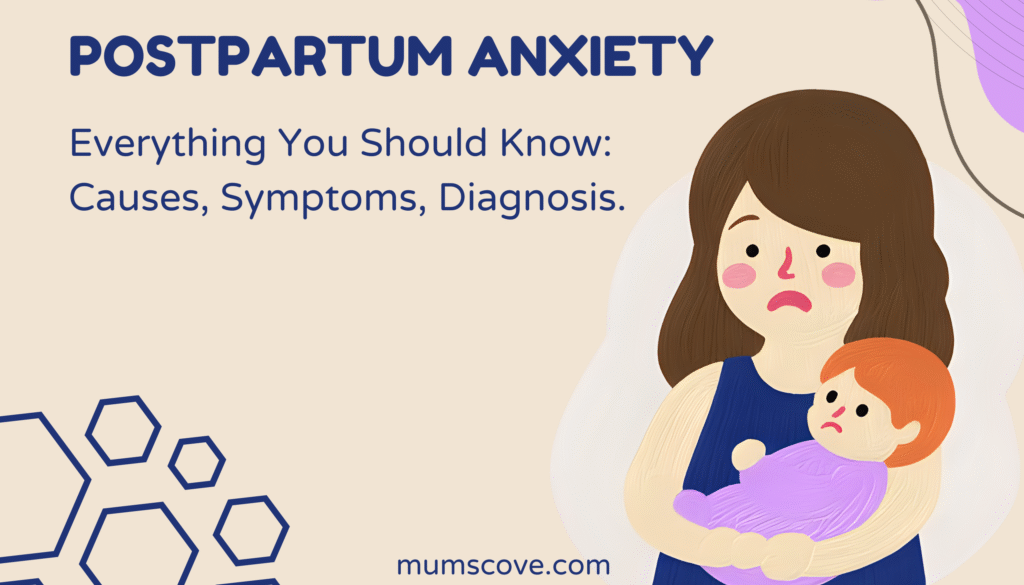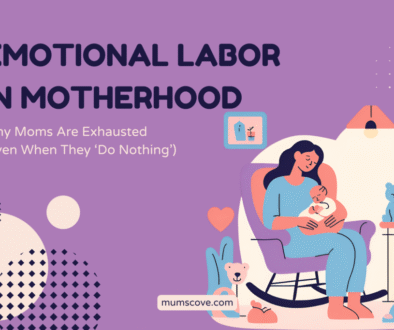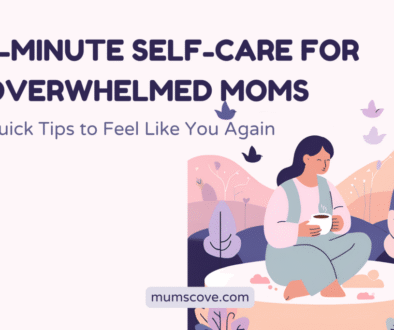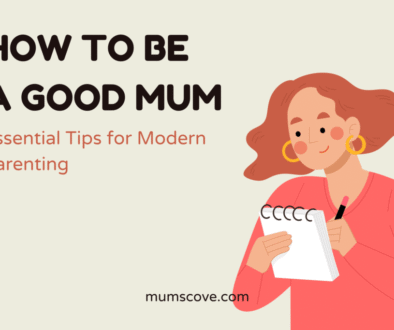Postpartum Anxiety Symptoms You Can’t Ignore (Everything You Should Know)
The arrival of a new baby is often painted as a time of pure joy and blissful bonding. And while those moments certainly exist, for many new mothers, the postpartum period can also be fraught with unexpected and overwhelming emotions. If the immense joy you anticipated is clouded by persistent, racing worries, intense fear, or even panic, you might be experiencing something more than the “baby blues.” You could be facing postpartum anxiety symptoms, a common but serious condition that deserves attention and compassionate care.
Many mothers feel a pressure to be perfectly happy and capable, making it difficult to admit when they’re struggling. But know this: if you’re feeling anxious after welcoming your little one, you are far from alone. Understanding the specific postpartum anxiety symptoms is the first crucial step toward acknowledging your experience and seeking the support you rightfully deserve to navigate this challenging yet transformative time. This guide is here to walk you through those symptoms, help you understand their triggers, and empower you to find help.
Understanding Postpartum Anxiety: More Than Just “New Mom Worry”
So, what exactly is postpartum anxiety (PPA)? It’s an anxiety disorder that can affect women after childbirth, characterized by excessive worry, fear, and unease that goes beyond typical new parent concerns. While it’s normal to worry about your baby’s well-being or your new responsibilities, PPA involves an intensity and persistence of anxiety that can significantly impact your daily life and your ability to enjoy your new baby.
Statistics show that postpartum anxiety is surprisingly common. While exact numbers vary, some studies suggest that up to 20-25% of new mothers experience significant anxiety symptoms ([External Link: Reputable Study on Postpartum Anxiety Prevalence]). This makes it potentially even more common than postpartum depression in some populations.
It’s vital to distinguish postpartum anxiety symptoms from two other common postpartum experiences:
- The “Baby Blues”: Most new mothers (up to 80%) experience the baby blues within the first few days to two weeks after delivery. This can involve mood swings, tearfulness, irritability, and some anxiety. However, the baby blues are typically mild, transient, and resolve on their own without specific treatment.
- Postpartum Depression (PPD): While PPA and PPD can (and often do) co-occur, they are distinct. PPD is primarily characterized by persistent sadness, hopelessness, loss of interest in activities, and sometimes thoughts of self-harm or harming the baby. PPA, on the other hand, is dominated by fear, worry, and a sense of impending doom. Many women with PPD also experience anxiety, and vice-versa, making a professional diagnosis essential.
Recognizing these distinctions can help you better articulate your feelings and guide you toward the right kind of support.
Core Postpartum Anxiety Symptoms You Need to Know
Postpartum anxiety symptoms can manifest in a multitude of ways, affecting your thoughts, feelings, and even your physical well-being. Being aware of these signs is key to early identification and intervention.
Constant or Excessive Worry (The “What Ifs” on Overdrive)
This is a hallmark symptom. The worries are often centered on the baby’s health, safety, development, or your ability to care for them.
- Racing thoughts: Your mind might feel like it’s going a mile a minute, jumping from one concern to another without rest.
- Inability to “turn off” your brain: Even when you try to relax, the worries persist, making it hard to enjoy quiet moments.
- Catastrophizing: Minor concerns can quickly escalate into worst-case scenarios in your mind. For example, a slight cough from the baby might trigger fears of a serious illness.
- Frequent reassurance seeking: You might constantly ask your partner or doctor if the baby is okay, or if you’re doing things right, yet still feel unconvinced.
These symptoms of postpartum anxiety include excessive worry that feels uncontrollable and disproportionate to the actual situation.
Intrusive or Scary Thoughts (The Unwanted Visitors)
This can be one of the most distressing postpartum anxiety symptoms. You might experience:
- Unwanted, disturbing mental images or thoughts: These can be fleeting images or persistent thoughts about something bad happening to the baby (e.g., accidental harm, SIDS).
- Fear of being alone with the baby: This can stem from the fear of these thoughts or a fear of not being able to cope. It’s crucial to understand that having these intrusive thoughts does not mean you want to harm your baby or that you are a “bad” mother. They are a terrifying symptom of anxiety, and sharing them with a healthcare professional can bring immense relief and understanding. This is a space where shame often festers, but psychologists stress that these thoughts are common in PPA and are not indicative of intent.
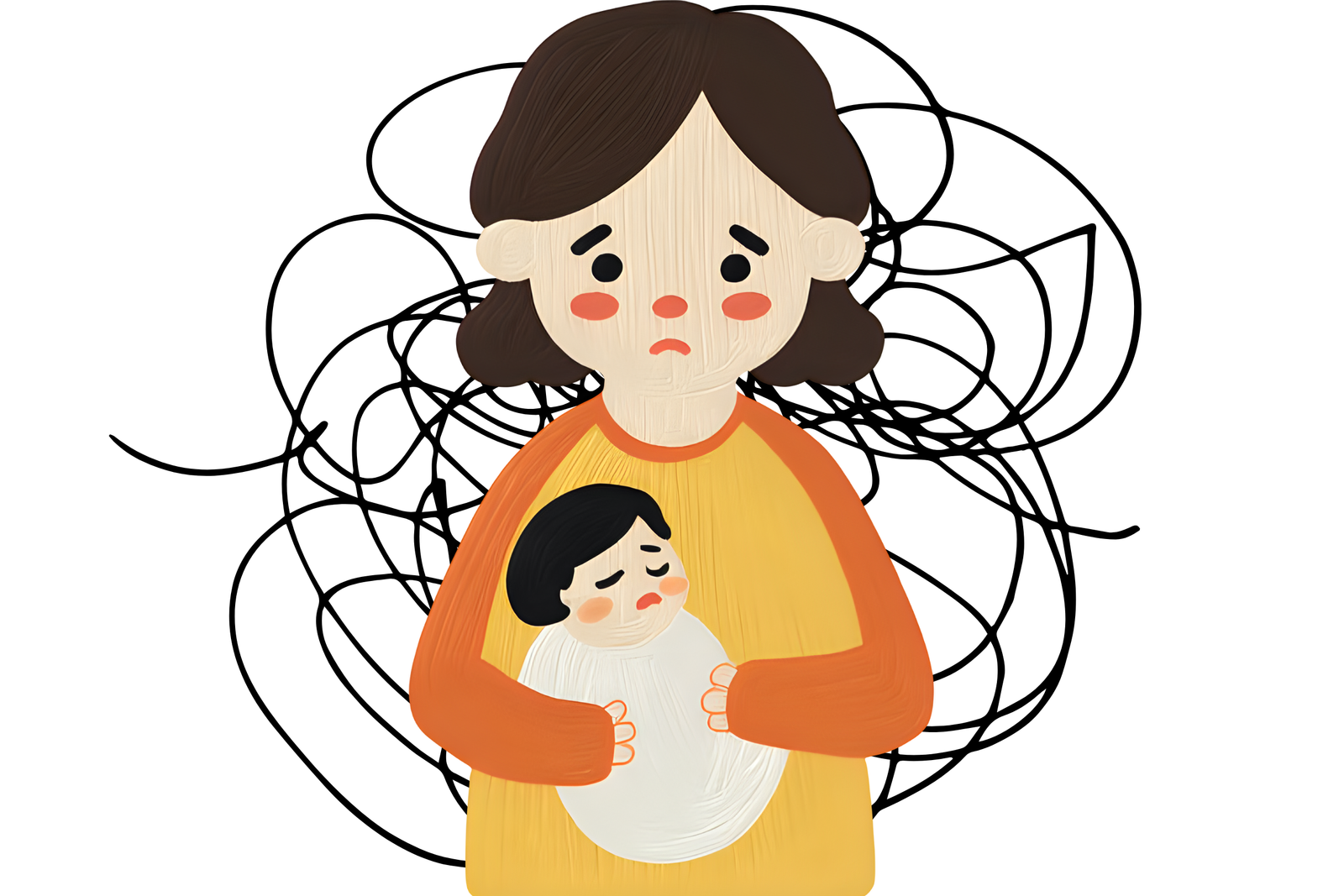
Physical Symptoms of Postpartum Anxiety (Your Body on High Alert)
Anxiety isn’t just “in your head”; it has very real physical manifestations. Many women experiencing PPA report:
- Racing heart or palpitations: Feeling like your heart is pounding or fluttering.
- Shortness of breath or a feeling of choking.
- Dizziness or lightheadedness.
- Nausea, stomach cramps, or diarrhea.
- Muscle tension: Especially in the neck, shoulders, or jaw.
- Headaches.
- Fatigue: An exhaustion that goes beyond the normal tiredness of new parenthood, often because your body is in a constant state of “fight or flight.”
- Shakiness or trembling.
- Hot flashes or chills.
These physical postpartum anxiety symptoms can be frightening and may even lead you to believe something is physically wrong, prompting visits to the doctor for non-psychiatric reasons.
Sleep Disturbances (Beyond Baby’s Demands)
While every new parent expects sleep deprivation, PPA can make sleep even more elusive:
- Inability to sleep even when the baby is sleeping: You might be exhausted but find yourself lying awake, mind racing with worries.
- Difficulty falling asleep: Worries and physical restlessness can keep you up for hours.
- Waking up frequently with a sense of panic or dread.
This lack of restorative sleep can then exacerbate other postpartum anxiety symptoms, creating a vicious cycle.
Restlessness and Agitation (Feeling “On Edge”)
A persistent feeling of being keyed up is common:
- Inability to relax or sit still: You might feel a constant urge to be doing something, checking on the baby, or tidying up.
- Irritability: Snapping at your partner or older children more easily.
- A feeling of being constantly “on guard.”
Panic Attacks (Sudden Surges of Intense Fear)
Some women with PPA experience full-blown panic attacks. These are sudden episodes of intense fear that can peak within minutes and involve several of the following:
- Overwhelming terror or a sense of impending doom.
- Chest pain or discomfort.
- Feeling like you’re choking or can’t breathe.
- Dizziness, lightheadedness, or feeling faint.
- Numbness or tingling sensations.
- Fear of losing control, “going crazy,” or even dying. Panic attacks are terrifying but not dangerous. Recognizing them as a severe manifestation of postpartum anxiety symptoms is important for seeking appropriate help.
Avoidance Behaviors (Steering Clear of Triggers)
To cope with overwhelming anxiety, you might start avoiding certain situations:
- Avoiding going out with the baby due to fear of germs, something bad happening, or being judged.
- Avoiding certain aspects of baby care if they trigger specific fears.
- Withdrawing from social interactions.
Changes in Appetite
Anxiety can significantly impact your desire to eat:
- Loss of appetite or forgetting to eat.
- Less commonly, increased appetite or “stress eating.”
Difficulty Concentrating or Making Decisions
The mental clutter of anxiety can make focus difficult:
- Trouble concentrating on tasks, reading, or conversations.
- Feeling overwhelmed by simple decisions.
- Forgetfulness.
Recognizing these diverse postpartum anxiety symptoms is the first empowering step. If several of these resonate with your experience, it’s a strong indicator that you may be dealing with PPA.
What Triggers or Worsens Postpartum Anxiety Symptoms?
While PPA can affect anyone, certain factors can increase vulnerability or exacerbate symptoms:
- Hormonal Shifts: The dramatic drop in estrogen and progesterone after childbirth can significantly impact brain chemistry and mood.
- Sleep Deprivation: This is a universal challenge for new parents, but chronic lack of sleep severely impairs your ability to cope with stress and can amplify anxiety.
- Personal or Family History of Anxiety: If you’ve had anxiety disorders before pregnancy, or if they run in your family, your risk is higher.
- Previous Traumatic Birth Experience: A difficult or traumatic delivery can leave you feeling vulnerable and anxious.
- Lack of Social Support: Feeling isolated or unsupported by a partner, family, or friends can make coping much harder. This is where the principle of social proof in reverse can be damaging; feeling alone in your struggle makes it worse.
- Societal Pressure & Unrealistic Expectations: The immense pressure to be a “perfect mother” and the often-sanitized portrayal of motherhood in media can lead to feelings of inadequacy and anxiety when reality doesn’t match up. This cognitive dissonance can fuel anxious thoughts.
- Perfectionism or High Self-Expectations: If you tend to be a perfectionist, the unpredictable nature of new parenthood can be a major anxiety trigger.
- Major Life Stressors: Other concurrent stressors like financial worries, relationship difficulties, or health issues (for you or the baby) can compound PPA.
- Thyroid Imbalances: Sometimes, an overactive or underactive thyroid postpartum can mimic or worsen anxiety symptoms. It’s worth getting checked.
Understanding these potential contributors can help demystify why you might be feeling this way, reinforcing that it’s not a personal failing.
When to Seek Help for Postpartum Anxiety Symptoms
It’s crucial to reach out for professional help if your postpartum anxiety symptoms:
- Are causing you significant distress.
- Persist beyond the first couple of weeks postpartum (i.e., they are not just the “baby blues”).
- Interfere with your ability to function daily (e.g., care for yourself or your baby, go to work, maintain relationships).
- Impact your ability to bond with your baby.
- Include panic attacks or intense, scary, intrusive thoughts.
- Lead to thoughts of harming yourself or your baby (this is a crisis – seek immediate help).
Experts emphasize that early intervention significantly improves outcomes. There’s no shame in needing support; in fact, seeking help is a sign of strength and love for yourself and your family. You wouldn’t hesitate to see a doctor for a physical ailment after childbirth, and your mental health is equally important.
You Are Not Alone: Finding Support and Treatment for PPA
The good news is that postpartum anxiety is highly treatable. Several effective strategies and resources can help you manage postpartum anxiety symptoms and reclaim your well-being:
- Talk to Your Healthcare Provider: Your OB/GYN, midwife, or general practitioner is often the first point of contact. They can screen you for PPA, rule out other medical causes (like thyroid issues), and refer you to mental health specialists.
- Mental Health Professionals:
- Therapy (Psychotherapy): Cognitive Behavioral Therapy (CBT) is particularly effective for anxiety. It helps you identify and change negative thought patterns and behaviors. Interpersonal Therapy (IPT) can also be beneficial. A therapist provides a safe space to process your feelings without judgment – a powerful antidote to shame.
- Psychiatrists: Can prescribe medication if needed and manage more complex cases.
- Medication: Anti-anxiety medications or antidepressants (many of which are safe during breastfeeding) can be very effective in managing moderate to severe postpartum anxiety symptoms. Your doctor will discuss the risks and benefits with you. For many, medication provides the stability needed to fully engage in and benefit from therapy.
- Support Groups: Connecting with other mothers who understand what you’re going through can be incredibly validating and reduce feelings of isolation. This leverages social proof in a positive way. ([Internal Link: How to Find a Postpartum Support Group Near You])
- Lifestyle Adjustments (Supportive, Not Curative on Their Own):
- Prioritize Sleep (As Much As Possible): Enlist your partner, family, or friends to help with night feeds or allow you to nap.
- Nutrition: A balanced diet can support overall well-being.
- Gentle Exercise: Once cleared by your doctor, activities like walking can boost mood.
- Mindfulness and Relaxation Techniques: Deep breathing, meditation, or yoga can help manage acute anxiety.
- Accept Help: When people offer to cook, clean, or watch the baby – say yes!
- Lean on Your Support System: Talk to your partner, trusted friends, and family about how you’re feeling. Sometimes, simply voicing your fears can lessen their power.
Remember, finding the right combination of treatments may take time, but recovery is absolutely possible.
A Message of Hope and Empowerment
If you are reading this and recognizing yourself in the description of postpartum anxiety symptoms, please know this: you are not broken, you are not a bad parent, and you are not alone. Postpartum anxiety is a legitimate medical condition, triggered by a complex interplay of biological, psychological, and social factors. It is not a reflection of your love for your baby or your capabilities as a mother.
The journey of motherhood is profound, but it doesn’t have to be defined by overwhelming anxiety. Recognizing these symptoms is your first brave step. The next is reaching out for help. Imagine a future where the constant hum of worry fades, replaced by a greater sense of calm, confidence, and joy in your new role. This future is achievable.
Conclusion: Your Wellbeing Matters
Navigating early parenthood with postpartum anxiety symptoms can feel like an uphill battle in the dark. But by shedding light on what PPA looks like – the incessant worry, the racing heart, the intrusive thoughts, the urge to flee – we can begin to dismantle its power. Remember the core symptoms: excessive worry, physical unease like a racing heart or nausea, sleep disturbances beyond the norm, restlessness, and even panic attacks. These are not signs of weakness but signals that your mind and body need support.
You deserve to experience the joys of parenthood without the constant shadow of anxiety. Help is available, and recovery is more than just a possibility—it’s an expectation with the right support.
If these postpartum anxiety symptoms resonate deeply with your experience, please take the courageous step of talking to a healthcare provider or a trusted loved one today. Your mental health is paramount. Share this article with any new parent, friend, or family member who might find it helpful. Spreading awareness can make all the difference.
External Links:
Internal Links:
- Why Are Women Afraid of Motherhood? based on scientific research
- 78% of Moms Handle Emotional Labor Alone—Here’s How to Share the Load
